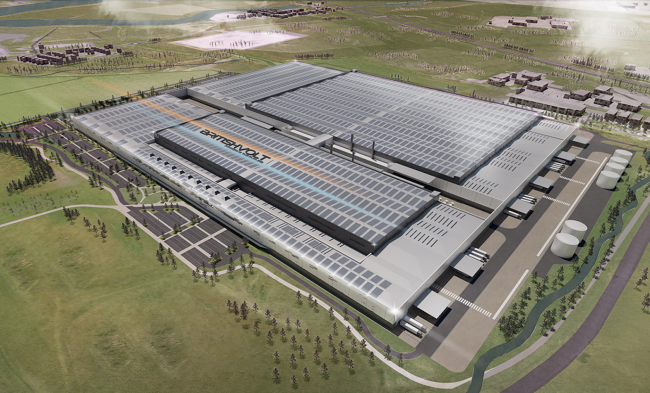2 minute read - 11th July 2022
Next phase of work at Britishvolt’s gigafactory site begins
One of Europe’s largest construction projects has reached a key milestone this week, as the first train load of aggregate arrived at the Port of Blyth in Northumberland to kick start the main ground works phase of Britishvolt’s £3.8bn gigafactory development. ISG, Britishvolt’s main construction partner, started the enabling works at the site in September 2021.
The first 1,500 tonne load of aggregate, from a quarry at Shap in Cumbria, is part of a total consignment of 316,000 tonnes of stone critical for the formation of a stable surface to install over 15,000 foundational piles around the perimeter and within the footprint of the 25-hectare building – equivalent to 50 football pitches in size. Two train deliveries will be made each day to the port for the next 24 weeks.

A key milestone has been reached in the construction of Britishvolt’s £3.8bn gigafactory development in Northumberland / Picture: ISG
The Port of Blyth will become a key materials hub for the project, and once a stockpile of aggregate has accumulated, a major haulage operation will commence to transport the aggregate from the port to the site – a 1.3 mile journey. A total of 334 journeys will be made every day, with one lorry load entering the site every three minutes over the 24 week period. This operation will remove many thousands of vehicle journeys off the main roads surrounding Cambois and Blyth, support 10 roles at the Port of Blyth, as well as local haulage contractors for the duration of this phase of works.
Rob Bradley, construction director for ISG, said: “Logistical and timetable constraints ruled out direct deliveries to the site from the existing rail line adjacent to our site boundary, so we sought an alternative solution that would minimise disruption and support the local economy. The Port of Blyth is an ideal materials hub, with the infrastructure and logistical expertise to run this programme-critical operation, and this solution importantly uses skilled operatives that were facing a challenging future as existing haulage contracts were winding down in the area.”

Britishvolt is on target to manufacture some of the world’s most sustainable, low carbon battery cells on the site of the former Blyth Power Station coal stocking yard / Picture: Britishvolt
Craig Woodburn, head of ESG at Britishvolt, added: “Building the UK’s largest gigafactory is an immense undertaking, but despite the scale, complexity and pace of this ground-breaking scheme, our project team interrogates every decision we take to maximise value for the regional economy here in Cambois, while also reducing the local environmental impact of developing a new site. By selecting primarily rail movements over road transport we reduce local impact and reduce overall carbon emissions associated with getting the material to our site.
“The key milestones that have taken this project from a concept vision to shovel ready project in record time have all been achieved through consent and collaboration with the local community, and we are committed to paying forward this belief and trust in Britishvolt by making the right decisions, not the easy ones, to ensure we create a true legacy transformation for this region for generations to come.”